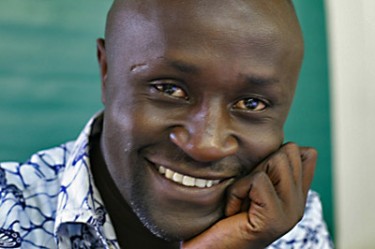
Didace Namujimbo, journalist from radio Okapi assassinated on november 21st 2008 in DRC by Maneno.org on Flickr ( CC-NC-2.0)
On September 9th, 2010, the International Press Institute (IPI) granted the “Free Media Pioneer” to Okapi Radio, the UN radio in the Democratic Republic of Congo, created by the UN Organization Stabilization Mission in the D.R. of Congo MONUSCO and the Swiss NGO Fondation Hirondelle. The radio has been broadcasting since 2002 in an effort to contribute to the peace building process in the country.
Since its inception, Okapi radio has displayed great ambition. The website Grand Lacs described its mission thusly [fr]:
Le projet Radio OKAPI, c’est: Un réseau de transmissions par satellite et de diffusion en ondes courtes et en FM, ainsi que sur l’Internet.
[…]
Des programmes consacrés à une information rigoureuse, non partisane, crédible, diffusés sur l’ensemble du territoire. Des programmes en français, en lingala, en swahili, en tshiluba, en kikongo, dans d’autres langues locales, et en anglais.
Des programmes consacrés à la santé, à l’éducation, aux droits de l’homme, à la culture, à la musique.
[..]
These programs are dedicated to providing rigorous, non-partisan, credible information all over the territory. The broadcasts are sometimes in French, in Lingala, Swahili, Tshiluba, Kikongo other local languages, and English. The topics covered include health, education, human rights, culture and music.
Reliefweb provides some background information on the impact of radio Okapi in DRC [fr]:
« Huit ans après avoir commencé à émettre, Radio Okapi a prouvé sa pérennité et a changé le visage de la couverture de l'actualité de la RDC »
Selon l'IPI, « dans un pays qui a souffert de la violence et du sous-développement, Okapi contribue à la paix et à la démocratisation en permettant la libre circulation de l'information ».
Radio Okapi a également contribué à la propagation de l'information dans et autour de la RDC grâce à son site internet qui est le site d'information le plus visité de la RDC, avec plus de 400.000 connexions par mois.
According to IPI: ” in a country that has suffered from violence and under-development, Okapi contributes to peace and democratization by allowing for information to circulate freely”. Radio Okapi also contributes to information distribution through the DRC thanks to its website which is the most visited news website in DRC with 400,000 visits per month.
The radio project also inspired the documentary: “Radio Okapi- Radio of Life” that won several awards and was broadcast on several TV channels such as TV5 and francophone Belgian tv RTBF. Eric Maillard discusses the documentary on his blog [fr]:
Produit et réalisé par Pierre Guyot, ce film de 52 minutes se révèle touchant, percutant et tout simplement utile. Il propose en particulier des images d’archive extrêmement rares sur le génocide rwandais.
En 1994, au Rwanda, « La radio des mille collines » a réglé minute par minute le dernier génocide du 20ième siècle qui fera plus d’un million de morts. La République Démocratique du Congo, pays voisin, a elle aussi connu une guerre civile qui a fait des millions de victimes. Avec des journalistes, Radio Okapi est née de cette volonté de faire autrement dans une zone de conflit : apporter aux citoyens une information juste et équilibrée et faire de cette radio un instrument de paix.
For africine.org, Radio Okapi is[fr] :
… la fréquence de la paix en République Démocratique du Congo et la première radio nationale de cet immense pays au coeur de l'Afrique. Sa vocation : fournir une information fiable, rigoureuse et professionnelle à ses auditeurs. Elle diffuse ses programmes sur une grande partie du territoire congolais. Outre le studio principal à Kinshasa, elle dispose de 8 stations régionales, d'une vingtaine d'émetteurs FM et de 3 emetteurs ondes courtes. Dans ces stations, une petite centaine de journalistes, animateurs et techniciens se relaient 7 jours sur 7 pour offrir à la RDC une information de qualité en français, lingala, swahili, siluba et kikongo.
Afriqueinvisu.org gives the following take on Okapi Radio and the documentary [fr]:
… est née du constat qu’aujourd’hui, en zone de conflits, là où la propagande est une arme de guerre, l’information crédible parce que non partisane, peut être une arme de paix.
« Radio Okapi, radio de la vie » propose des images totalement inédites du génocide rwandais, prouve qu’un média d’information peut promouvoir la démocratie et surtout montre le courage et le talent des journalistes de Radio Okapi dont certains ont, depuis le tournage de ce reportage, payé cette détermination de leur vie.
On Afriqueactu.net, Jean-Pierre Ndongo reminds us of the objectives of the IPI awards and the latest awards winners [fr]:
Créé en 1996, cette récompense honore les médias qui contribuent au développement d’une presse libre dans leur pays grâce aux efforts inlassables qu’ils fournissent et aux risques qu’ils prennent. Les derniers lauréats du prix comprennent « Novaya Gazeta », journal de la Fédération de Russie (2009), le blog américain « Talking Points Memo » (2008), l’agence de presse « Mizzima Inde & Birmanie » (2007), le journal « Yemen Times » (2006) et la radio indépendante zimbabwéenne « SW Radio Africa ».
For more information on Okapi radio, here is their website.







1 comment
I have never had to worry about distinguishing between propaganda and true information while I was there, but now radio station like Radio Okapi are beacon of hope in a country where powers that be tend to make everyone sing and dance to the same tune.
Congratulations on the award and keep up the good work!!
Joe